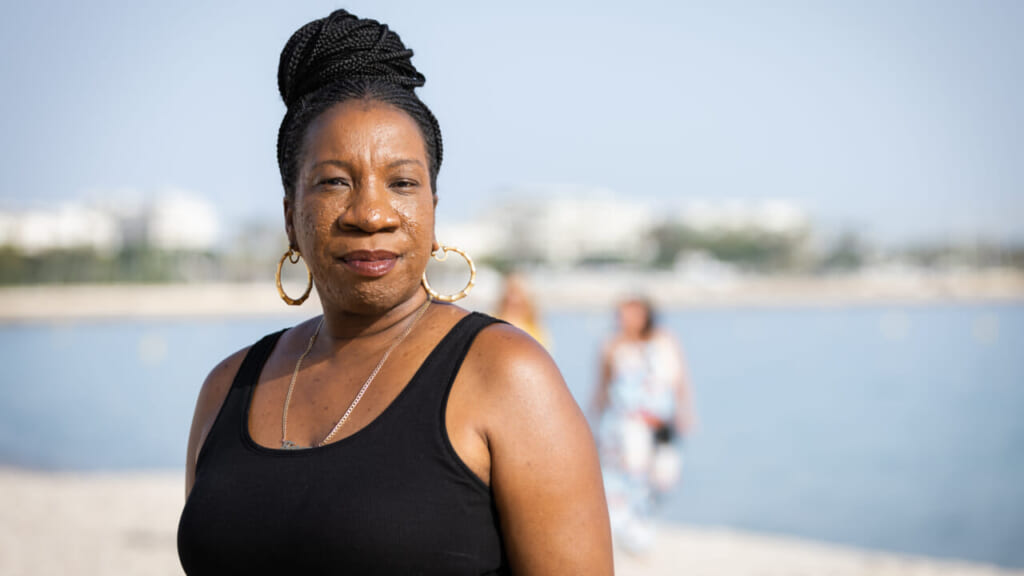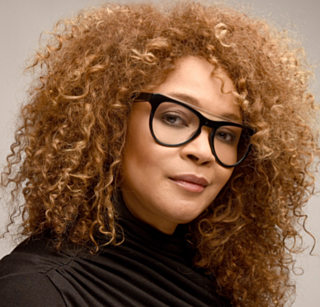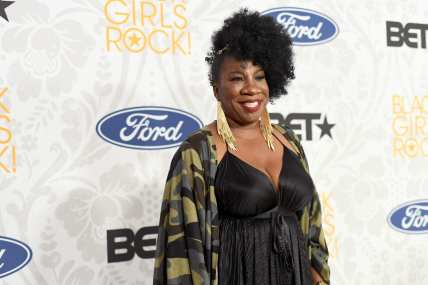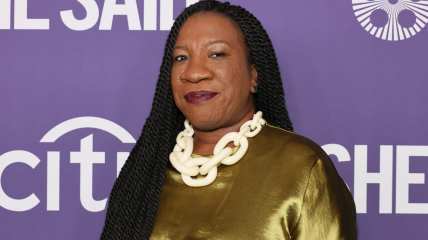What’s next for #MeToo? Bringing healing home to our communities, says Tarana Burke
Five years after #MeToo was adopted by the mainstream, Tarana Burke's focus remains on the Black communities in which her activism was forged.
Editor’s note: This is the second of a two-part interview with Tarana Burke in commemoration of the fifth anniversary of the #MeToo movement. The first installment was published on Saturday, Oct. 15.
During one of her speaking engagements overseas this past summer, Tarana Burke noticed a group of Black men in the audience. After her talk was over, one of the men approached her.
“‘Sis, I have never heard you speak before,'” Burke remembers him saying. “‘I didn’t know what to expect. And I stuck around ’cause I wanted to hear what all the fuss was about.'” He added, “‘I’m just pleasantly surprised…I was sitting here telling my boys, ‘We got to protect her at all costs.'”

on June 22, 2022 in Cannes, France. (Photo by Richard Bord/Getty Images)
Heartened by his words, Burke recalls responding, “‘Please, could you spread the word that I love Black men? Could you spread the word that there’s no part of me that is anti-Black anything—and that loving and wanting to protect Black women has nothing to do with tearing down Black men?'”
To those familiar with Burke’s story prior to the explosion of the hashtag that catapulted her already-established #MeToo movement into the zeitgeist (note: then as in now, the organization’s name is hashtag-free), her response isn’t revelatory. In her 2021 bestselling memoir, “Unbound,” Burke chronicled the years of organizing and advocacy she has been engaged in since adolescence, propelled by her love for Black people and communities. However, with the mainstream appropriation of #MeToo and her rising profile came a common misunderstanding, both of Burke’s priorities and the communities she still seeks to serve, and that #MeToo is a Hollywood movement, rather than a homegrown one.
“It’s in the zeitgeist; it’s a part of the lexicon now,” said Burke, admitting that shifting the cultural conversation around sexual violence has been bittersweet, as #MeToo has become both a touchstone and a catchphrase often carelessly employed in popular culture. “I just wish people were more thoughtful about language, even as a trigger for people, like for survivors,” she told theGrio ahead of the movement’s fifth anniversary. “But it’s challenging…so we do a lot of work trying to just get good information out there and get it out in the world so that people have something to balance all of the misinformation with.”
There is more than just saying #MeToo…every hashtag that said #MeToo represents a human being. And we want to go beyond the hashtag to make sure that those human beings have what they need and that they’re represented.
Tarana burke
With regard to the #MeToo movement as we’ve come to know it in the past five years, Burke attested that the impetus of the movement itself “hasn’t changed much,” despite the fact that both its platform and she undeniably have. “It is still a movement about healing and action,” she said. “I think what’s changed more than anything is that we dream bigger. We think bigger. I think our ideas around shifting narratives have been more influenced by the last five years.
“Definitely, I can say five years ago, I wasn’t thinking that narrative work would be a part of my movement work…the importance of language; the importance of how our stories could be used; stories of survival as opposed to stories of trauma,” she explained. “I’ve grown; my analysis has grown and evolved. I’ve sort of matured in how I see things because I’ve been exposed to another reality. I had no understanding of how to utilize mainstream media because I didn’t have access to mainstream media…Those kinds of things have changed. I’ve expanded my thinking, but now the trick is taking that same thinking around working for Black folks and mainstreaming it.”
For the organization’s fifth anniversary, a yearlong celebration titled “Beyond the Hashtag,” the goal was to launch a different type of digital revolution than the one that made headlines in October 2017. With the launch of a comprehensive social and justice framework, the #MeToo movement has doubled down on its efforts to provide much-needed support to individual survivors. “Our website is something that we put a lot of resources into to make sure that it is a place where survivors, all kinds of survivors, survivors of color, neurodivergent and survivors with disabilities, survivors who identify in multiple ways can find themselves, find resources, find space for themselves on our website,” Burke explained, referring to the Survivor’s Sanctuary launched on site in April.
However, #MeToo’s next initiative is to reshape community responses and resources through its soon-to-be-launched Community Healing Circles. Twelve-week workshops are intended to train and help participants to understand sexual violence as dangerous and as prevalent as any other violence affecting their respective communities, says Burke.
“I talk a lot about individual healing, but I also believe in what I call community healing. Meaning when a person experiences sexual violence in a community, oftentimes we think about what they need as an individual or we think about only the individuals—the person who got harmed and the person who caused the harm. But I think that we have to think about it more collectively,” she explained.
“Like when a person is shot in the community, we think more expansively. We think [about] who got shot, the person who did the shooting, and also we think about the safety of everybody else who could potentially be shot. And that’s the way we have to frame the way we think about communities, so all communities have to all heal from all the violence that happens inside of them, including sexual violence. So that’s the kind of work we’re going to be embarking on with our community healing circle; this is what we have to look forward to.”
In her work and countless appearances over the past five years, Burke has frequently referred to the spectrum of sexual violence, ranging from seemingly benign and often discounted verbal aggressions to brutal physical assaults. Both ends of that spectrum can have an extreme impact on an individual life or community; as she discussed the action needed now, Burke applied that same framework to activism.
“I think if there is a spectrum, it consists of the multiple types of interventions that are needed…we need that spectrum in the movement—and in this particular movement, that would be from the Instagram, Twitter, social media activists all the way to the person who puts their body right on the frontlines of this work,” she said. “But I think all of it is necessary because we need every type of intervention that is useful and that moves the work forward in order to continue to move the needle.
“So there will be people who are gonna be check writers. There are going to be people who are going to be marchers and protesters. There are going to be big thinkers; there are going to be journalists; there are going to be writers. There are going to be performers—people who are going to influence the narrative by producing plays and writing movies and writing songs and [making] cultural interventions. There are going to be all kinds of people—the people who do the research; the people who are on the front lines,” she continued. “And I think that’s the spectrum that we have to look at, and [that] I’m grateful for in this movement. It’s a huge spectrum, but all of it is necessary. All of it is relevant. All of it is incredibly important because the issue, the problem is so big, so the spectrum has to be really big.”
With #MeToo becoming one of the most recognizable hashtags in the world, does Burke ever worry the movement has gotten lost in its social media presence? “The hashtag was important and it propelled the movement into the mainstream, but we’re moving beyond the hashtag because we want people to know that there is more than just saying #MeToo,” she said. “There’s what happens after you say #MeToo and that every hashtag that said #MeToo represents a human being. And we want to go beyond the hashtag to make sure that those human beings have what they need and that they’re represented.”
Still, leading and representing a global movement is an overwhelming task. Reflecting on the man who approached her this summer, Burke noted, “It’s definitely moments like that that make me feel like the work is worth it; that make me feel like we have to keep going; that make me feel like people are getting it, and this is why we’re here. I am forever eternally grateful for the people that hear me and hear us and take a minute, just give us a second.
Chuckling, Burke channeled an evangelist as she joked, “It’s like, you know, ‘Do you have a moment to hear the good news?’ Just give us a second to get in your ear…when we have those opportunities, it just makes all the difference. It really does.”
Read more from #MeToo founder Tarana Burke in the first part of her interview with theGrio, published on Saturday, Oct. 15

Maiysha Kai is theGrio’s lifestyle editor, covering all things Black and beautiful. Her work is informed by two decades’ experience in fashion and entertainment, great books and aesthetics, and the brilliance of Black culture. She is also the editor-author of Body (Words of Change series).
TheGrio is FREE on your TV via Apple TV, Amazon Fire, Roku, and Android TV. TheGrio’s Black Podcast Network is free too. Download theGrio mobile apps today! Listen to ‘Writing Black’ with Maiysha Kai.


